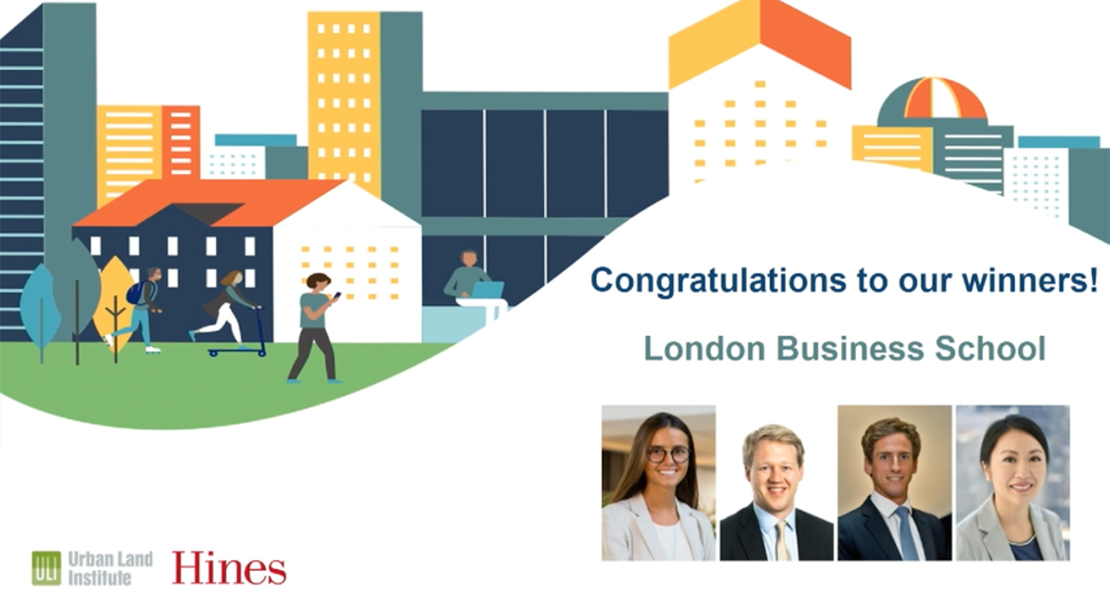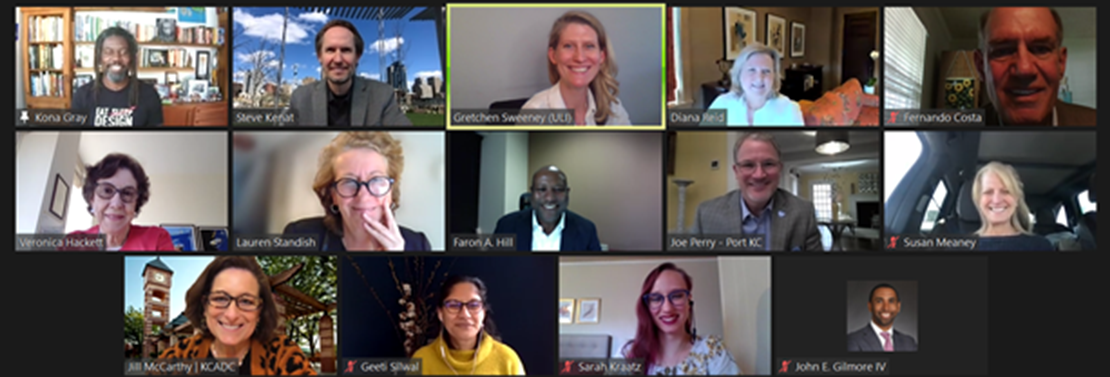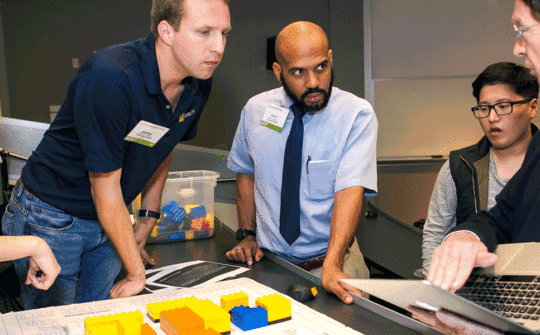There are now two formats of the ULI Hines Student Competition, after a tailored version was created in the Europe, Middle East, and Africa region last year, and both had to embrace virtual experiences following the challenges created by the global pandemic.
The 19th annual ULI/Gerald D. Hines Student Urban Design Competition—an event that challenges graduate students to devise a comprehensive design and development plan for a real site in an urban area—adopted a fully virtual format for the first time.
This year’s competition, which began January 11, simulated an actual design, planning, and development scenario, and asked students for proposals to create a thriving mixed-use, mixed-income area in the East Village neighborhood in downtown Kansas City, Missouri. The challenge brief asked the students to address housing affordability, equity, transportation, mobility, sustainability, and resilience in their proposals.
The four teams that advanced to the final round of the competition were chosen from 105 entries by a jury of 16 leading ULI members representing a broad variety of real estate and related disciplines. This year, students formed teams representing 61 different universities in the United States, Canada, and Singapore, including 31 teams with students from more than one university.
On March 19, the students rehearsed their proposals and received feedback from six experts and ULI members from Kansas City. On April 8, they presented their plans virtually to the 16-person jury of ULI members from around the country.
Team Fusion, comprising students from Ryerson University, York University, and the University of Toronto, took top honors and were awarded a prize of $50,000. The remaining three finalist teams—with representatives from the Georgia Institute of Technology, University of Houston, Pennsylvania State University, and Columbia University in the City of New York, and the University of California, Berkeley—each received $10,000.
The winning plan from Ryerson University, York University, and the University of Toronto seamlessly fused the East Village, Paseo West, and Kansas City’s downtown core. Designed around two key pillars, connectivity and resilience, this neighborhood embodied inclusive and sustainable growth within Kansas City.
The Fusion team was composed of Frances Grout-Brown and Leorah Klein, Ryerson University; Yanlin Zhou, York University; and Ruotian Tan and Chenyi Xu, the University of Toronto.
“Reflecting on this experience in its entirety, it’s surreal how much we’ve learned along the way,” the team said in a statement. “We started the competition with a shared vision to create an inclusive, sustainable, and welcoming neighbourhood that felt uniquely Kansas City. Though each member of the team brought different skills to the table, we were strongly aligned in our aspirations for the site.”
“The 2021 ULI Hines Competition finalists raised the level of creative thinking and technical execution delivered in the competition,” said ULI Hines jury chair Diana Reid. “This was a challenging brief; it required a bold vision for the future, balancing economic impact, environmental sustainability, enhanced mobility, and social equity. Each of the finalists delivered catalytic development proposals. Fusion stood out because its financing plan and design enabled economic resilience through small-scale food growth and distribution, local culinary incubation, and research-driven employment opportunities.”

Across the Atlantic, a team from the London Business School won the pan-European version of the Hines Student Competition, which challenged teams to present their vision of a future workplace, based on the redevelopment of an office site in Amsterdam. The four winning students each received a one-year ULI membership, a fast track to Hines’s internship program, a guided tour of a live Hines project, and participation in project meetings in Hines’s European offices.
Eight teams out of 35 entries were selected as finalists and worked on a challenging exercise in responsible land use, presenting their ideas and solutions to a distinguished jury of recognized leaders from across Europe.
Emanuel Dos Santos Rebelo, Dermot Mahony, Beatriz Vala, and Yoko Yamada from the London Business School beat seven other teams from a diverse array of academic institutions—including Copenhagen Business School, Denmark; EBS Universität für Wirtschaft und Recht, Germany; IESE Business School, Spain; INSEAD, France; Politecnico di Milano, Italy; Universidad Politécnica de Madrid, Spain; and University of Cambridge, United Kingdom—to win the coveted prize.
Team captain, Yoko Yamada, from the London Business School, commented: “I’m over the moon, but the whole team is key to this win. It’s an absolute honor to come out on top of the competition. We have been working toward this behind the scenes for the past month in terms of preparation with group study sessions, so we’re all equally very pleased that our efforts have paid off.”
The final consisted of a whole day of virtual sessions, where the finalist teams were tasked with the topical challenge of the future of the workplace assessing their understanding of how offices will evolve and remain connected to the communities in which they operate well into the future. The teams were challenged to develop their vision for the office site, setting out the mix of uses they felt most appropriate, along with an environmental, social, and governance (ESG) strategy and their proposed financials for the scheme. They worked in multidisciplinary teams, with the support of Hines mentors.
Innovative ideas for the future of the office during the final included organic indoor and outdoor gardens, canopies with vegetation and wildlife, outdoor office pods embedded in nature, serviced lofts in the upper echelons of the office space, solar chimneys, a rooftop lighthouse, and an amphitheater to connect with the local community.

Lars Huber, CEO of Hines Europe, said: “We are very proud to partner with the ULI to offer this incredible competition for the second year running. It has again showcased some remarkable emerging talent across Europe. The winning team deserves the plaudits as the competition was exceptionally tough, but all the finalists should be incredibly proud of their performance and efforts. We saw some novel ideas, fantastic concepts, and innovative thought processes about how the future of work will look and how the real estate sector will need to adapt to multigenerational needs. We remain committed to this competition for the long term as we look to continue to support young professionals breaking into our fantastic industry while broadening out the talent pool to attract creative and diverse talent.”
Lisette van Doorn, CEO of ULI Europe, added: “ULI’s mission is to shape the future of the built environment for transformative impact in communities worldwide, and with our global, multidisciplinary, and multigenerational focus, this competition is a perfect example of what ULI stands for. Seeing the enthusiasm and motivation from the competing students has been fantastic and, thanks to the generous support of Hines, we are thrilled to be able to provide them with a springboard to start their career in the industry. We’ve been very impressed with the creativity and solutions provided, that we urgently need to adapt to in the post-COVID-19 reality, trying to tackle some of the major challenges that were accelerated by the pandemic, such as decarbonization, social inequality, and advanced innovation. We hope everyone involved today will join the industry and continue their journey with ULI when developing their careers, by leveraging our content and our global network.”


